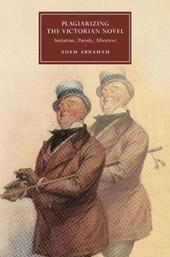
|
Plagiarizing the Victorian Novel: Imitation, Parody, Aftertext
Hardback
Main Details
Description
How can we tell plagiarism from an allusion? How does imitation differ from parody? Where is the line between copyright infringement and homage? Questions of intellectual property have been vexed long before our own age of online piracy. In Victorian Britain, enterprising authors tested the limits of literary ownership by generating plagiaristic publications based on leading writers of the day. Adam Abraham illuminates these issues by examining imitations of three novelists: Charles Dickens, Edward Bulwer Lytton, and George Eliot. Readers of Oliver Twist may be surprised to learn about Oliver Twiss, a penny serial that usurped Dickens's characters. Such imitative publications capture the essence of their sources; the caricature, although crude, is necessarily clear. By reading works that emulate three nineteenth-century writers, this innovative study enlarges our sense of what literary knowledge looks like: to know a particular author means to know the sometimes bad imitations that the author inspired.
Author Biography
Adam Abraham is a Postdoctoral Fellow at Virginia Commonwealth University. He is the author of When Magoo Flew: The Rise and Fall of Animation Studio UPA (2012) as well as articles on Victorian literature and culture.
Reviews'Focused on three important Victorian novelists, Charles Dickens, Edward Bulwer Lytton, and George Eliot ... Plagiarizing the Victorian Novel is an illuminating, stylish, and necessary archeology of some of these lost works.' Monica F. Cohen, The Review of English Studies 'Abraham's book, among its other aspects, demonstrates a seismic shift in English studies over the past half-century. Plagiarizing the Victorian Novel presents itself as part of a specialism-wide, co-operative effort.' John Sutherland, The Times Literary Supplement 'Plagiarising the Victorian Novel makes a useful contribution to the ongoing conversation surrounding forms of textual afterlife, recognizing the productive overlap between issues of plagiarism and those of identity, fraud, agency and intent ...' Elly McCausland, Dickens Quarterly 'Adam Abraham's meticulously researched, expertly theorized, and engagingly written Plagiarizing the Victorian Novel upends traditional conceptions of the canon ...' Carrie Sickmann, Reception: Texts, Readers, Audiences, History '... the book makes for pleasurable reading. Abraham's prose is clear, witty, jargon-free, and the work he has done on these aftertexts, including his concise summaries, will provide future scholars with rich new material for years to come.' Lisa Rodensky, Victorian Studies
|